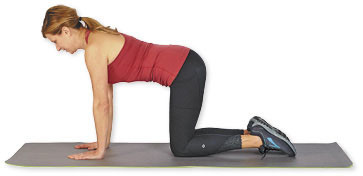
Driving with arthritis pain: Stay comfortable — and safe — behind the wheel

Daily cup of coffee may prevent afib recurrence

Gene-editing therapy lowers harmful blood fats in early study

What is EMDR therapy, and who can it help?

GLP-1 drugs versus bariatric surgery for treating obesity

Two dumbbells, three exercises, and 10 minutes

Easing the emotional burden of IBS

Modify your push-ups to meet your fitness level

What is long QT syndrome?

Stroke survivors may benefit from very low LDL levels
Physical Activity Archive
Articles
Prediabetes: A window of opportunity
About 96 million Americans have prediabetes, defined by elevated blood sugar levels that are not high enough to qualify as diabetes. Risk factors include overweight or obesity, family history, and inactivity. People with prediabetes may have more infections and frequent urination or blurry vision after big meals. Lifestyle changes such as maintaining a healthy weight, exercising, eating healthy foods, drinking alcohol moderately, and not smoking may prevent prediabetes from progressing to diabetes.
Reaping the rewards of running
Running can boost cardiovascular fitness faster and better than walking, but this high-impact activity comes with a higher risk of injuries than walking. Beginning runners should start slow and alternate walking and running at first. Doing strength training and increasing mileage gradually may help. People who sustain minor injuries when running should rest for a few days and consult a physical therapist if the injury doesn't get better.
The BEEP program: Keep your balance
As people get older, the complex system that helps them maintain balance does not work as effectively, increasing the risk of a fall. A study found that specific exercises can improve balance in older adults.
Exercise can reduce fatigue in breast cancer patients undergoing radiation
A 2022 study suggests that regular exercise may improve fatigue and physical and emotional well-being among women undergoing radiation treatment for breast cancer.
The skinny on fatty liver
The body's second largest organ, the liver is responsible for more than 500 bodily functions. One of the liver's greatest threats is nonalcoholic fatty liver disease (NAFLD), an umbrella term that includes several forms of liver disease. Most people with NAFLD have a type known as simple fatty liver. However, up to 20% of people with NAFLD develop inflammation in the liver known as nonalcoholic steatohepatitis (NASH). Left unchecked, this more dangerous form can progress into fibrosis (scarring) and potentially cirrhosis (severe scarring and liver damage). Lifestyle changes, such as weight loss, increasing exercise, and adopting a plant-based diet are the best means to manage and prevent NAFLD.
Taking up adaptive sports
People with disabilities or physical limitations can still stay active and get the recommended amount of exercise by participating in adaptive sports and activities. These often run parallel to traditional endeavors but are modified to support an individual's needs. Popular choices include cycling, skiing, archery, kayaking, rowing, tennis, bowling, swimming, basketball, and golf.
Move of the month: Opposite arm and leg raise
The core muscles include those of the abdomen, lower back, front of hips, and spine. Many popular sports such as cycling, golf, tennis, and swimming depend on a stable, flexible core.
Exercising when you have a heart condition
For people with all types of cardiovascular disease, regular exercise helps prevent the disease from getting worse. Even very short exercise stints can make a difference. Many people with heart disease qualify for cardiac rehabilitation, which includes an exercise stress test that shows how your heart and body respond to exertion. The results can inform recommendations for safe, effective physical activity.
A closer look at good cholesterol
Doctors concentrate on helping men lower their blood levels of low-density lipoprotein (LDL), or "bad" cholesterol, to lower their risk of cardiovascular disease. Lower HDL levels are associated with higher cardiovascular risk. This may be related to HDL's role in helping to remove excess cholesterol in arteries that can lead to plaque buildup and increase the risk of heart attacks and strokes. However, no specific therapies to raise HDL levels have improved outcomes.
Short bursts of exercise may offer big health benefits
Performing at least 15 minutes of vigorous exercises per week, which includes several short bouts lasting up to two minutes, may lower a person's risk of heart disease, cancer, and early death.

Driving with arthritis pain: Stay comfortable — and safe — behind the wheel

Daily cup of coffee may prevent afib recurrence

Gene-editing therapy lowers harmful blood fats in early study

What is EMDR therapy, and who can it help?

GLP-1 drugs versus bariatric surgery for treating obesity

Two dumbbells, three exercises, and 10 minutes

Easing the emotional burden of IBS

Modify your push-ups to meet your fitness level

What is long QT syndrome?

Stroke survivors may benefit from very low LDL levels
Free Healthbeat Signup
Get the latest in health news delivered to your inbox!
Sign Up











